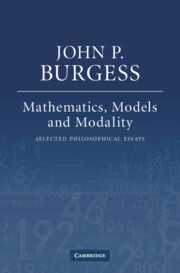Book contents
- Front matter
- Contents
- Preface
- Source notes
- Introduction
- PART I MATHEMATICS
- 1 Numbers and ideas
- 2 Why I am not a nominalist
- 3 Mathematics and Bleak House
- 4 Quine, analyticity, and philosophy of mathematics
- 5 Being explained away
- 6 E pluribus unum: plural logic and set theory
- 7 Logicism: a new look
- PART II MODELS, MODALITY, AND MORE
- Annotated bibliography
- References
- Index
5 - Being explained away
Published online by Cambridge University Press: 22 September 2009
- Front matter
- Contents
- Preface
- Source notes
- Introduction
- PART I MATHEMATICS
- 1 Numbers and ideas
- 2 Why I am not a nominalist
- 3 Mathematics and Bleak House
- 4 Quine, analyticity, and philosophy of mathematics
- 5 Being explained away
- 6 E pluribus unum: plural logic and set theory
- 7 Logicism: a new look
- PART II MODELS, MODALITY, AND MORE
- Annotated bibliography
- References
- Index
Summary
A LOGICIAN LOOKS AT NOMINALISM
When I first began to take an interest in the debate over nominalism in philosophy of mathematics, some twenty-odd years ago, the issue had already been under discussion for about a half-century. The terms of the debate had been set: W. V. Quine and others had given “abstract” and “nominalism” and “ontology” and “Platonism” their modern meanings. Nelson Goodman had launched the project of nominalistic reconstruction of science, or of the mathematics used in science, in which Quine for a time had joined him before turning against him. William Alston and Rudolf Carnap and Michael Dummett had raised doubts about what the point of Goodman's exercise could be; and though they had unfortunately been largely ignored, Quine's contention that the exercise cannot be successfully completed had gained wide publicity as the so-called indispensability argument against nominalism. By contrast, two subtle discussions of Paul Benacerraf had been appropriated by nominalists and turned into the socalled multiple reductions and epistemological arguments for nominalism.
While such arguments, if sound, would suffice to establish the nominalist position even if Quine were right that mathematical entities cannot be eliminated from science, nonetheless a number of nominalists were just then setting out to prove Quine wrong.
Information
- Type
- Chapter
- Information
- Mathematics, Models, and ModalitySelected Philosophical Essays, pp. 85 - 103Publisher: Cambridge University PressPrint publication year: 2008
Accessibility standard: Unknown
Why this information is here
This section outlines the accessibility features of this content - including support for screen readers, full keyboard navigation and high-contrast display options. This may not be relevant for you.Accessibility Information
- 1
- Cited by
